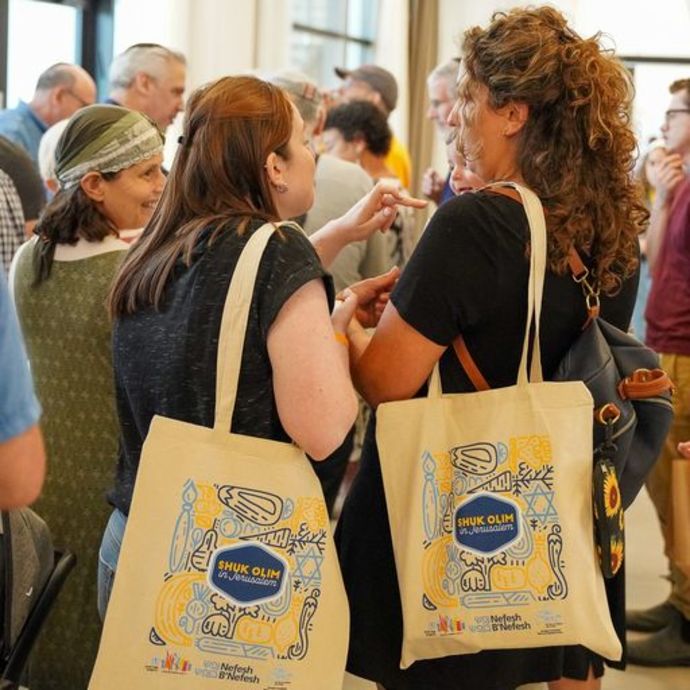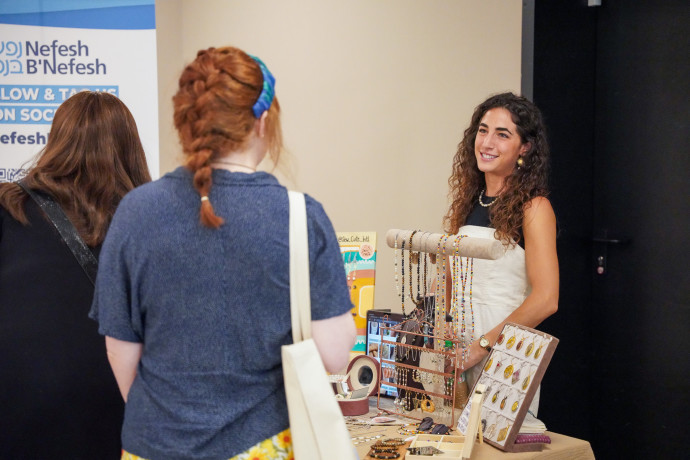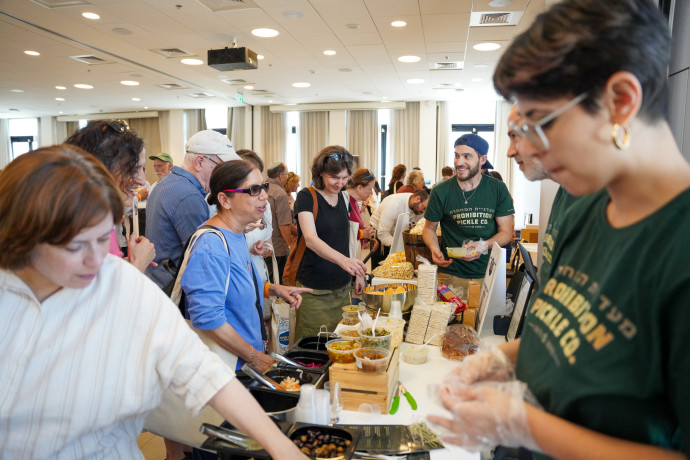On Friday, June 29, some 500 English-speaking Israelis converged upon the Nefesh B’Nefesh Aliyah Campus in Jerusalem for a noisy, boisterous, and fun-filled morning at the organization’s first annual Nefesh B’Nefesh Shuk Olim. Thirty vendors – all recent olim (immigrants) – displayed and sold their wares, from popcorn to pickles, from handmade jewelry to artisanal honey, for eager visitors who came from Ra’anana, Beit Shemesh, Modi’in, Tel Aviv, and, of course, Jerusalem.
 Learn how to buy your home in Israel with confidence
Learn how to buy your home in Israel with confidence“Olim love supporting each other and take a lot of pride in the accomplishments of their fellow olim,” says Shira Kahn, marketing operations manager at Nefesh B’Nefesh. “There was a wide range of people in attendance, including young professionals, older couples, entire families – which exceeded many of our expectations.”

Kahn says that the goal of the Shuk, which was conducted in cooperation with the Jerusalem Municipality’s Absorption Authority, was to provide olim with a center that supports them and gives their business exposure and support. The 18 food and 12 craft vendors who participated were busy selling and demonstrating their wares to the happy shoppers who visited.
While Nefesh B’Nefesh promotes olim businesses on its small business spotlight series on social media and patronizes olim-owned businesses for its events, Shuk Olim was the first effort of its kind to enable these businesses to sell to a large group of visitors at one time. The vendors who participated in Shuk Olim were delighted to have the opportunity to reach their natural clientele, which in many cases is the predominantly English-speaking community.
Julia Levine, owner of Sew Cute International, arrived in Israel in August of 2020 on a nine-month Masa program with eight other participants in the midst of the pandemic. A good portion of the program, she notes, was spent in COVID-inspired isolation. After the program ended, Levine says she needed a “do-over” and stayed in Israel another nine months before deciding to make aliyah in January 2021.

She hails from Eden Prairie, Minnesota, where the high temperature in January is -4 degrees Celsius, and the lows are -13 degrees. “I traded the snow for palm trees,” Levine says happily.
Levine makes handmade jewelry and embroidered attire, sewing designs on caps, shirts, sweatshirts, and bags. She sources thrifted jewelry from local flea markets, takes them apart, and turns them into something new and original. “The idea is to be colorful, affordable, and special,” she says.
Levine operates the business from her Tel Aviv home and has found other young entrepreneurs in the Tel Aviv area who are in similar types of businesses. She sells her products at a pop-up store in the Florentin neighborhood that rotates different vendors at different times.
“I have been making jewelry and clothes my whole life,” says Levine. “My grandmother gave me a sewing machine when I was eight, and my mother was an art teacher for 35 years, so I grew up with a craft room in my house.”
Levine learned about Shuk Olim, which did not charge vendors to exhibit, from a mutual friend, and she was very pleased with the results. “There was a wonderful flow of people there, who were curious,” she says. “It was amazing to see all the other people running beautiful businesses and making amazing things in the art shuk. I am blown away by the number of people doing what they love, and it was a great opportunity to network and see what talented artists are out there.”
She hopes that Nefesh B’Nefesh will host additional events like this for olim-run businesses. “These events are amazing, not just to show people what olim are up to but also to give olim a platform to do what we love in a supportive space and give us the most amazing framework to do what we love to do. I appreciated it so much.”
Another vendor who greatly appreciated the event was Chaim Davids, proprietor of Prohibition Pickle, which, according to its website, is “an imaginative new-world delicatessen serving elevated old-world Ashkenazi fare.”

Davids grew up in Baltimore, has worked in the food industry for many years, and graduated culinary school in 2005. He operated a kosher restaurant in the San Francisco Bay area before making aliyah 13 years ago with his wife and children. Prohibition Pickle prepares deli foods, pickles, herring, kishke, and cholent, but he says, “We are doing it a little bit differently. It is a modern interpretation of classic Ashkenazi soul food.”
During corona, Prohibition Pickle operated as a storefront in the Harim Mall in Gush Etzion, but since then has become an online deli and catering operation located near the Migdal Oz industrial area of Gush Etzion.
Like Levine, Davids was thrilled with Shuk Olim and the responses that it generated. “Most of our customer base is Anglo,” he says. “We gave out lots of free tastings of pickles, herring, and deli, and we also sold a lot. It was special to connect with existing clients and customers.”
Yosef Ortega viewed Shuk Olim as an opportunity to connect visitors with his new business, the Gush Etzion Brewstillery. Ortega, who grew up in Los Angeles and lived in Denver for the last 13 years, made aliyah in October 2020 during the pandemic – “the most difficult time to get any documentation,” he quips – with his wife and seven children.
Although he had close to 30 years of experience in the food service industry, from being a pastry chef to doing direct store deliveries for national food brands, Ortega found the food industry in difficult straits when he arrived during the pandemic and had to piece together work until the situation improved.
Ortega opened the Gush Etzion Brewstillery on Lag Ba’omer of this year. He says it is a hybrid between a brewery and a distillery that is currently marketing craft beer that it has developed and created. The actual brewing is being done at a brewery in Beit Shemesh, allowing the company to test its branding without the expense of maintaining a full-scale brewery. Ortega says that private labeling is something that many companies do and is a good way to minimize costs.
The company’s two products are a honey ale called Rosh Gadol, and a roasted amber ale, with two more ales under development. Ortega adds that the company is also working on a new whiskey, which will also be contract distilled in another location.
At Shuk Olim, Ortega was giving out free tastings of his products and engaging with the customers to get feedback. “The global market for craft beer is $117 billion,” he says. Israel has less than 1% of that market. Our mission is to create an Israeli influence on the craft beer market as a whole.
“There is great interest,” he reports. “We wanted to focus on the local brand and community in Gush Etzion and Jerusalem. We are getting requests from Tel Aviv and from northern Israel.”
And Shuk Olim? “What an event!” he exclaims. “The carryover from that one event – we are still getting people contacting us. What a brilliant idea! This gave us a great platform. Having recently made aliyah and starting a business, you are in a unique category. It’s neat to meet other businesses that are in the same situation, as well as other consumers who have recently made aliyah. It is a great space.”
Shira Kahn from Nefesh B’Nefesh says that in response to the positive reception of the event among the public and vendors, the organization is planning a second Shuk Olim to be held before Rosh Hashanah. “The attendance and enthusiasm went far beyond anything we expected. After the event, we were trying to figure out why that was. We came to the conclusion that they just like seeing olim succeed and want to be a part of that camaraderie.”
This article was written in cooperation with Nefesh B’Nefesh, which works in close cooperation with Israel’s Ministry of Aliyah and Integration, The Jewish Agency for Israel, Keren Kayemeth LeIsrael, and JNF-USA.
 Sign up for our newsletter to learn more
Sign up for our newsletter to learn more 